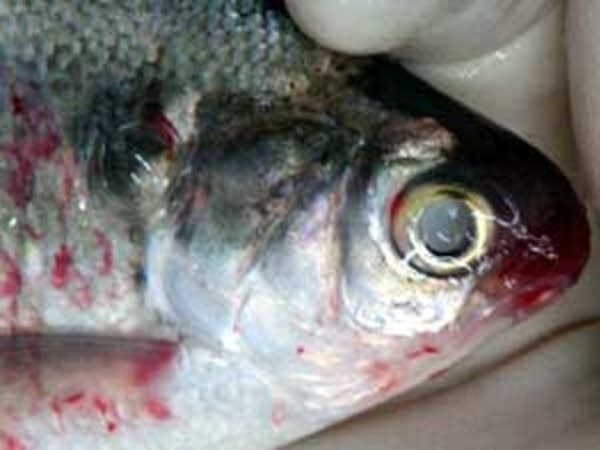Fighting the VHS fish virus

VHS is a little virus with a big name - viral hemorrhagic septicemia. Infected fish might have bulging eyes; bloated bellies; or red blotches. Some major fish kills are blamed on VHS.
The disease isn't a danger to humans, but it's a very real problem for fish that haven't faced this disease before. VHS can hammer dozens of fish species -- everything from freshwater drum, to northern pike, round goby, and walleye.
The disease is frightening both for the size of fish kills and the wide variety of fresh water fish species it's been killing, according to Daryl Bathel of Duluth. Now retired, Bathel used to oversee the Department of Natural Resources cold water hatcheries.
"They've never been exposed to this," Bathel said. "So, they're very susceptible to it. And there's going to be die-offs that occur when there's a pathogen that's here and a stress that would causes an outbreak of disease to happen. It's better to keep that pathogen out of here."
Create a More Connected Minnesota
MPR News is your trusted resource for the news you need. With your support, MPR News brings accessible, courageous journalism and authentic conversation to everyone - free of paywalls and barriers. Your gift makes a difference.
So far, VHS has not been detected in Lake Superior. But, within the last three years, it's been confirmed in all the other Great Lakes; and Wisconsin's Lake Winnebago system. It's unclear how the disease spreads.
The National Park Service has joined with Minnesota's Grand Portage Chippewa band in a plan to defend their areas against VHS. The Park Service runs Wisconsin's Apostle Islands National Lakeshore; Michigan's Isle Royale National Park and Pictured Rocks National Lakeshore; and the Grand Portage National Monument in Minnesota.
Once it's here ... it's going to get spread all over the place.
Apostle Islands National Lakeshore Superintendent Bob Krumenaker said the plan establishes emergency measures should VHS show up; and it prods other agencies to take action on things like ship ballast water, and tightening the movement of bait and live fish.
"There are two countries; three states; several Indian bands; untold state and federal agencies," Krumenaker said. "Everybody's got a little piece of this and nobody's in charge. So we are certainly trying to stimulate the discussion and encourage our colleagues in other agencies to move forward faster perhaps than they would otherwise."
Krumenaker said the Apostle Islands and Isle Royale in particular are key to the Lake Superior fishery.
"We're really vulnerable right now," Krumenaker said. "And, frankly, these are places that have some of the most vital fish resources for recreational fishing and even the commercial fishing that happens in and outside the parks."
In Minnesota, state lawmakers are considering new legislation that would tighten permits and certification for hatcheries and bait dealers.
Fish farmers and hatcheries would have to test tanks and ponds at a cost of at least several hundred dollars a pop. The proposal would give the DNR the ability to move more quickly on emergency rules if VHS turns up in Minnesota.
A department official said there's a lot at stake.
"It is a very serious situation, because, number one, is that Minnesota has one of the great fishing resources in the country," said Roy Johannes, DNR Fisheries Program Consultant. "You know we have great walleye fishing; and a good muskie fishery. We have northern pike; pan-fish, bass."
Johannes said a collapse of the fishing industry would be felt across Minnesota.
And, if a virus reached Minnesota, it could quickly spread to a big chunk of the continent, according to Daryl Bathel, the retired DNR official in Duluth.
"Minnesota is kind of unique in that it's the point of high ground for three major drainage systems," said Bathel. "Once it's here, the next step is to jump into the inland waters. And once it's there, it's in the Mississippi River system. It's in the Hudson Bay drainage. And it's going to get spread all over the place."
Just the threat of VHS has prompted a change in fishing regulations in Canada. Visitors to Ontario's Quetico Provincial Park will have to fish this year without worms or minnows. All organic bait is banned. The Apostle Islands National Lakeshore is considering a similar ban.
The Minnesota DNR offers VHS information on its web pages, including a printable brochure. Their bill, the VHS Fish Health Initiative, is winding through the legislature.
